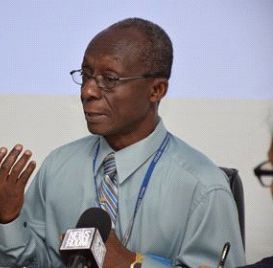Saying that proper labelling of alcoholic beverages is an effective strategy to encourage responsible drinking, Pan American Health Organization/World Health Organization (PAHO/WHO) country representative Dr William Adu-Krow recently disclosed that this is among the recommendations listed in an alcohol control policy, which was handed over to the Public Health Ministry several months ago.
“There are people who would buy alcohol and say, ‘Oh wow, this is 45% alcohol. No that’s too much…’They would even buy wine and say that they don’t want anything over 18% or 13%. So if the labelling is there and it is being enforced, I think it goes a long way,” Dr. Adu-Krow told Stabroek News.
During the interview, which was conducted at his Brickdam office, he stressed that labelling has been proven to be the “reliable” thing to do.
“Therefore, in the alcohol policy that he [Dr. Norman Giesbrecht, a Canadian based alcohol abuse specialist] drafted …it’s part of that policy because, like I said, there is evidence to show that it (labelling) is effective,” he added.
Dr. Adu-Krow’s comments come on the heels of a recent announcement by the West Indies Rum & Spirits Producers’ Association (WIRSPA) that Caribbean rum producers plan to introduce labels that include warnings in order to address concerns about the harmful use of alcohol.
WIRSPA, in a press release issued in June, described this as a “major initiative,” which resulted from a task force that was set up last year to see how best the industry could support the efforts of the regulatory agencies and health sector to encourage responsible drinking as part of a balanced, active healthy lifestyle, following the recognition that the harmful use of alcohol is a contributing factor to Non-Communicable Diseases (NCDs).
Pointing out that alcohol is not an illicit product, Dr. Adu-Krow said that one cannot tell persons not to drink but rather can urge persons to drink responsibly. “So what the label is going to show is the percentage of alcohol and the fact that you will have to be a responsible user,” he said, while adding that with proper labelling, a person will be mindful of the amount of alcohol they should consume based on the percentage amount, which will be printed on the bottle.
Further, he stressed that a person will be able to make an informed decision on what they should drink, particularly if they have to get behind the wheel.
Asked if the labelling will have any warnings about drinking during pregnancy, he did not give a direct answer but noted that there is a limit to what can be placed on a label. He later explained that drinking during pregnancy will be dealt with in public communication campaigns.
WIRSPA had alluded to this in its release. The plan is to introduce “new labels in domestic and regional markets that contain visual guides against drinking and driving, underage consumption and drinking during pregnancy, all areas of concern both for producers and for the health sector.”
The WIRSPA release added that the new labelling will also provide responsible drinking messages and calorie per serving information to “assist consumers in making the right choices about how they drink.”
Guyana, which has a thriving rum industry, has been struggling to control alcoholism for many years. Alcohol abuse has resulted in murders, domestic violence and fatal accidents and has placed a strain on the health, security and social services sectors.
Stabroek News’ asked Dr. Adu-Krow whether labelling would make a big difference, given that people don’t always read the fine print and would ignore warnings as is evident with cigarettes. He agreed that while smoking persists despite all the work that has been done by the authorities, successfully getting the message across to a few was encouraging. “I personally believe if you can save one person at a time …it’s worth doing it,” he said, while adding that there are persons out there who check alcohol content before they consume the beverage. “If we have it at least it empowers them to make decisions,” he said.
‘Public relations stunt’
WIRSPA’s announcement was not well received by activist Vidyaratha Kissoon, who has publicly expressed concern about the country’s alcoholism problem and the failure of the relevant authorities to effective tackle it.
“I am surprised that WIRSPA members are not already putting warning labels on their alcohol products. Many countries now have mandatory requirements to label alcohol products. I assume that WIRSPA members would have to put warning labels on the alcohol products exported to the countries with mandatory requirements. It is interesting that WIRSPA in the last year seems to be concerned about the impact of alcohol use though this might just be a public relations stunt,” he said.
He told Stabroek News that the use of warning labels on alcohol products does not seem to have much impact on the reduction of alcohol use, which would be good news for WIRSPA. Kissoon noted, too, that there are several factors which influence the success of the labels, such as literacy, age, and concerns about health and death.
According to Kissoon, the placement of warning labels might have the same impact as the fine writing about responsible drinking on some advertisements. He pointed this newspaper to a policy document published on the website of the Parliament of Australia, which questioned whether alcohol warning labels are working. It was concluded that the increased awareness of the risks of excessive drinking, which are generated by the labels, does not necessarily translate into behavioural changes in at-risk groups. It was suggested that the messages conveyed, firstly have to be similar to tobacco warning labels and, secondly, varied reasonably frequently.
Pointing out that the WHO had recommended a series of steps, including restrictions on advertising and sponsorship, Kissoon told this newspaper that “it is ironic in Guyana now that it is possible to get drunk in places and wreak havoc where you cannot smoke.”
He spoke of persons informing him of instances where they saw vendors selling alcoholic beverages to children at sports events. “There are global concerns about alcohol advertising and sponsorship of sports events. Rum and cricket is an example of the branding of the Caribbean inherited from the slave owners and their descendants and other enablers,” he added.
According to Kissoon, he is sickened at the fact that campaigns launched by GuySuCo and DDL in 2009 to address alcohol consumption did not result in any change. The target groups were GuySuCo employers, who would go on drinking sprees after pay day and then absent themselves from work, and underage drinkers.
“There was a short-lived campaign to get sellers to not sell to children. In 2018, the ‘problem’ still existed, but no real effort to stop sellers from selling to children. All alcohol sold to children contributes to the profits of the supposedly socially-conscious industry,” he said.
According to the activist, the Guyana government has never had the savvy or the money to counter the sophistication of the alcohol industry and the culture of drinking in Guyana. “There has been no political will to deal with alcohol consumption in Guyana. While the Ministry of Public Health might have some murmurings, other arms of the government, like the ones responsible for sport, rely on the alcohol industry for sponsorship,” he stressed.
Meanwhile, when asked if better results will be seen if the labelling is paired with an intense public awareness campaign, Dr. Adu-Krow responded in the affirmative. “Oh definitely… Without a doubt. The problem with intensive campaigning is that it’s costly and it has to be sustained. You cannot do an aggressive campaign for a month and then just (stop). It’s not going to work. As some people are stopping, some are influencing others…I think we need to do a lot more with the advertisements and the public campaign and it has to be maintained and all partners have to have to come in,” he said. He expressed optimism that with a good campaign, “we should be able to make inroads.”
Alcohol policy
With regard to the alcohol control policy, Dr. Adu-Krow told Stabroek News that he is satisfied with the work done by Dr. Giesbrecht, who stuck to the schedule and submitted the final policy document in February. He began his work towards the end of October last year and had visited Guyana to meet with stakeholders and gather information.
Shortly after receiving it, PAHO submitted the document to the Ministry of Public Health. “What is happening now is that the Ministry of Public Health will now have to take the leadership and take it to Cabinet …and government has to pass it as a policy and then have it implemented,” he said.
He noted that once the policy is adopted by government, the expert can help to implement the policy incrementally and PAHO will also assist in this regard. “Of course, because we don’t start anything that we can’t complete,” he said before underscoring that the ministry cannot do it on its own.
He also pointed out that there are many players involved besides the Health Ministry. He identified the ministries of Education, Public Security, Indigenous Affairs and Communities as well as the religious community. “It’s a whole of society approach,” he stressed.
The policy is aligned with the Global Strategy to Reduce the Harmful Use of Alcohol 2016 and the WHO’s “Best Buys” for alcohol prevention and control.
“Even though prevention of alcohol and substance use and related disorders are included in the agenda of the National Health Strategy for Guyana 2013-2020 (Health Vision 2020) and the Mental Health Action Plan 2015-2020, the country is still lagging with regard to the implementation of the WHO “Best Buys” (cost-effective interventions) to prevent and control alcohol use and abuse, especially among youth and indigenous populations in the country,” the Terms of Reference (ToRs) state.
Dr. Giesbrecht is currently the Emeritus Scientist at the Centre for Addiction and Mental Health (CAMH) and has several publications related to alcohol. He wrote the national alcohol strategy for Canada.
He is also the recipient of the Lifetime Achievement Award from the American Public Health Association’s Alcohol, Tobacco and other Drugs Sector.
Providing some more insight into the recommendations made by the consultant, Dr. Adu-Krow informed that the focus was mainly on ensuring that alcohol is used properly. Apart from the labelling, the expert looked at community mobilisation, empowerment through peer/youth friendly activities so that youth can influence other youth, no sale to minors, training persons in the business of selling alcohol to be able to identify who to sell to and who should not be sold and making sure that persons who are already alcohol dependent can be medically weaned off.
Dr. Adu-Krow stressed that the outcome should be the reduction of deaths associated with excessive use of alcohol products. “Alcohol… can lead to being shunned by your own family and if you are shunned by your own family, it is going to make it worse… and make you drink even more,” he said, while adding that he is not surprised at the lack of support facilities for alcoholics in Guyana. That being said, he told this newspaper that “it is high time” this is corrected.










